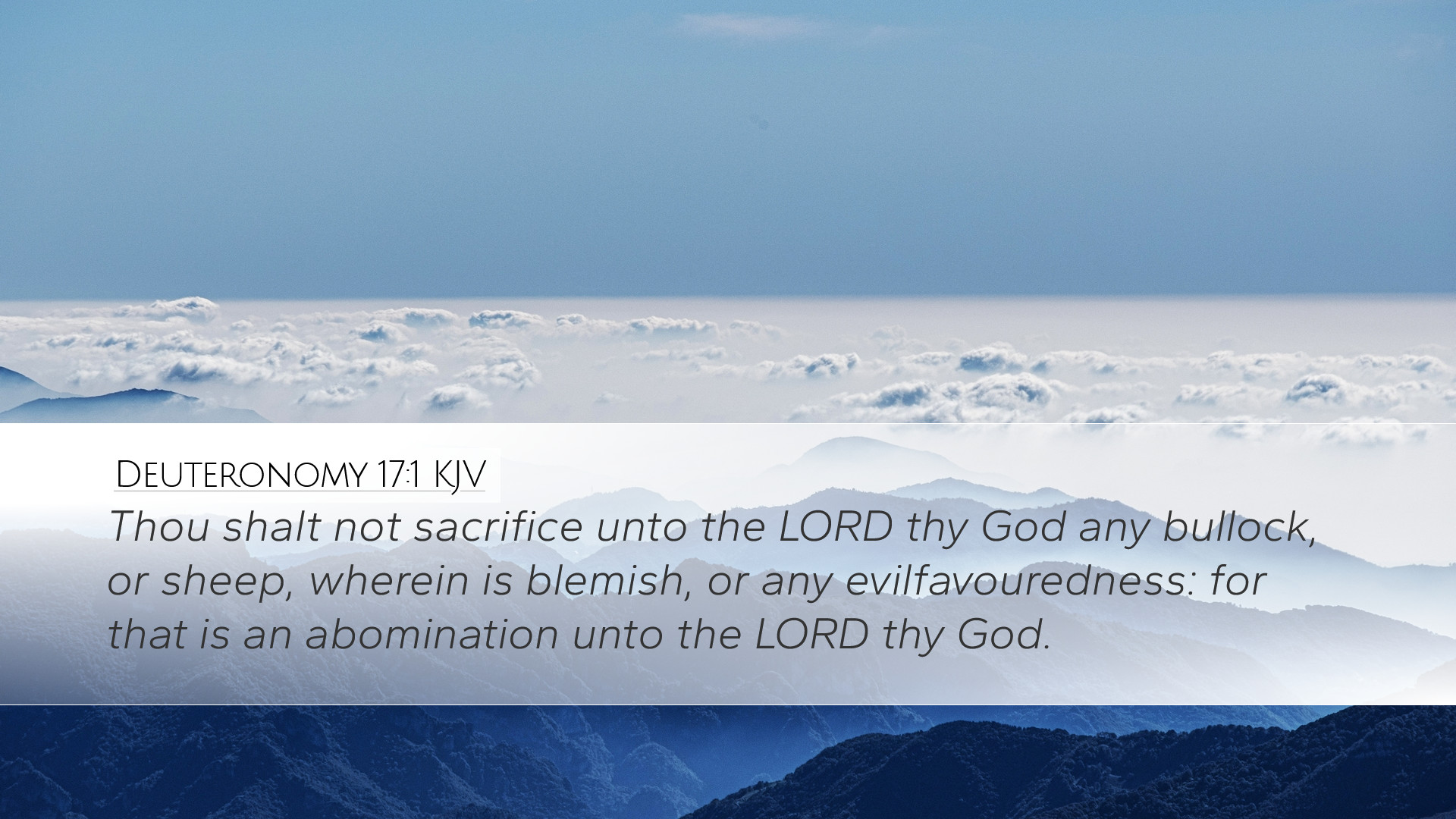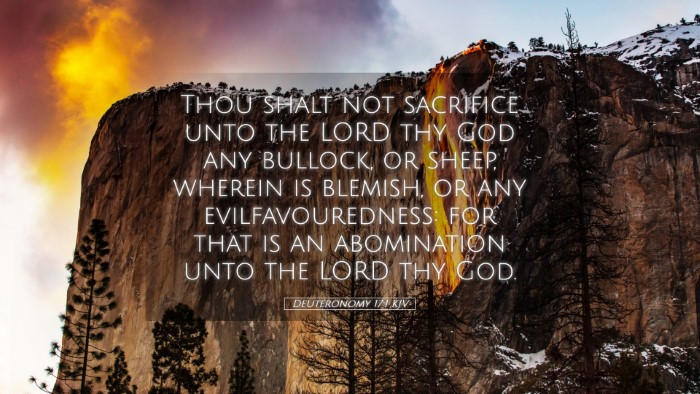Commentary on Deuteronomy 17:1
Bible Verse: "You shall not sacrifice to the LORD your God an ox or a sheep which has any blemish or defect, for that is an abomination to the LORD your God." (Deuteronomy 17:1) - New King James Version
Introduction
Deuteronomy 17:1 stands as a solemn reminder of the sanctity of worship and the quality of offerings presented to God. This verse serves as a foundational principle regarding sacrifices and highlights God's demand for purity and excellence in worship.
The Theological Implications
In this verse, the stipulation against offering blemished sacrifices points to several significant theological themes:
- Holiness of God: God's nature is intrinsically pure; thus, He requires offerings that reflect His character.
- The concept of Abomination: Any worship that does not meet God’s standards is viewed as detestable, emphasizing the seriousness with which God regards worship practices.
- Typology of Jesus Christ: The blemished offerings foreshadow the perfect sacrifice of Christ, underscoring that only through Him can believers approach a holy God.
Commentaries Overview
Various scholars have provided rich insights into Deuteronomy 17:1, each illuminating different aspects of the text:
Matthew Henry's Commentary
Matthew Henry emphasizes the importance of integrity in offering to God. He notes that the command against blemished sacrifices reflects God’s desire for worship that comes from the heart—a heart that values holiness. Henry writes, “It is not enough to come with sacrifices: God will be honored; and the honor must not only be from the outward acts but from the inward affections.” He encourages believers to examine their lives for “blemishes” that might impede their worship.
Albert Barnes' Notes
Albert Barnes focuses on the symbolic meaning behind blemished sacrifices. He states, "The prohibition against offering blemished offerings indicates a broader principle regarding all offerings to God in everyday life." Barnes reasons that our actions and motives should be constantly evaluated for sincerity and purity. He highlights the danger of half-hearted worship and encourages believers to offer their very best as a reflection of their reverence for God.
Adam Clarke's Commentary
Adam Clarke provides an exegesis that emphasizes the historical context of offerings in ancient Israel. He notes that the Israelites were surrounded by pagan practices that often included defiled worship, and thus, God’s instructions were designed to set them apart. Clarke remarks, “This command is a hedge against our natural laxity in duty, preserving the sanctity of God’s worship.” He stresses that these stipulations were not merely ceremonial but were intended to instill a deeper understanding of true worship to God.
Exegesis of Key Terms
Understanding the key terms within this verse is crucial for a comprehensive interpretation:
- Blemish: Refers to any physical defect that renders the animal unfit for sacrifice, signifying the importance of presenting something flawless to God.
- Abomination: A strong term indicating something that is loathsome or repulsive to God, emphasizing the seriousness of the command.
- Sacrifice: Represents not just the physical act, but the state of the heart—what one offers reflectively speaks of devotion to God.
Applications for Worship
There are modern applications derived from Deuteronomy 17:1 that can influence both personal and corporate worship settings:
- Pursuit of Excellence: Worship should not be careless; offering our best in every aspect—be it our time, resources, and talent—is essential in honoring God.
- Heart Check: Regularly evaluate our hearts and motives as we approach God with our offerings and worship; sincerity should always be prioritized over mere formality.
- Teaching Responsibility: Leaders should educate congregants about the significance of pure worship practices, ensuring that they understand the implications and seriousness of their actions.
Conclusion
Deuteronomy 17:1 stands as a timeless reminder of the importance of purity and integrity in our approach to worship. The insights from historical commentaries prompt pastors, theologians, and scholars to continuously reflect on the quality of their worship, both personally and corporately. As we strive to honor God through our offerings, let us be reminded that He desires a heart dedicated to holiness, aligning our sacrifices with His divine standards.


